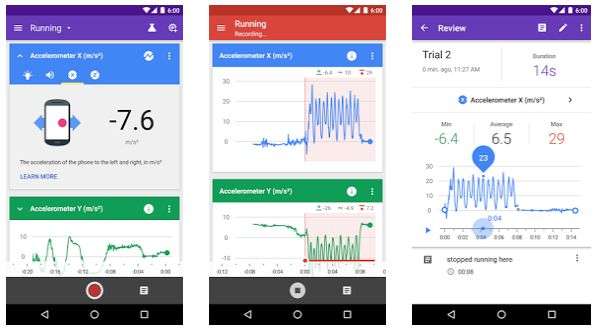May 24, 2016 weblog
Google Science Journal adds meat to bone for hungry science seekers

(Tech Xplore)—One way that younger learners can take notes, observe, interpret and predict: Google has announced a Science Journal. This is designed to be a digital science notebook for Android devices. What might be a 20-minute classroom talk can turn into a structured experiment using this app called Science Journal.
Android Police
said the app aims to help kids carry out experiments, observe their results, and then interpret them.
Science Journal is available in the Play Store.
Using the Science Journal app, turn your Android phone into a pocket science laboratory with tools to measure light, motion, sound and more," said the Making & Science site.
Fundamentally, as Google Play's display put it, "Science Journal is a tool for doing science with your smartphone." You can use the sensors in your phone or connect (connected via an Arduino) to external sensors to conduct experiments on the world around you.
Rita El Khoury in Android Police described what the journal does:
"Science Journal gathers data from your smartphone's sensors or compatible external sensors ... and data will be gathered automatically and in real-time by your phone and plotted on nice graphs for you. You can organize your experiments into different projects, add notes and photos while the experiment is running, and then explore and interpret your results. "
Chris DiBona, Director, Making & Science and Open Source, posted a blog on the Google for Education site. That site is the official source for information about Google's education-related efforts.
"Inspiring future makers and scientists with Science Journal," is the title of the May 20 announcement. DiBona took the opportunity to spell out what science is—and isn't. He said science is "not just memorizing facts, wearing a lab coat or listening to a lecture." He said science is more fundamental, all about observing the world around us to figure out how it works and how we can make things better through experimentation and discovery.
Similarly, he described what making is not—just about coding or working with electronics; it is also more fundamental in scope. "Making is about looking at the world around you and creating - or, you guessed it, making - ways to improve it."
The Science Journal goal is to help those who use it to explore and to measure the world around them. The other half of this announcement is news that they have teamed up with the Exploratorium - "a leader in science education - to develop and assemble creative hands-on learning activity kits to accompany the Science Journal app. These Science Journal kits include inexpensive sensors, microcontrollers and craft supplies that bring science to life in new ways. The kits are available for purchase in the US or can even be assembled yourself."
CNET referred to Exploratorium as a "public learning laboratory," to design kits to accompany the new app.
In addition, the announcement carried news that Google will leverage strength in numbers: they will be open sourcing the Android app later this summer and "We're excited to nurture an open ecosystem where people everywhere can use Science Journal to create their own activities, integrate their own sensors and even build kits of their own. To that end, we have released the microcontroller firmware code on GitHub."
All in all, they are eager to work with hardware vendors, educators and the open source community to continue improving Science Journal.
Actually, if this does blossom much one can foresee good things happening in two directions. Kids get to witness and explore and experiment; educators get to witness how young learners learn more in science and grasp scientific concepts that are new to them.
Commented Rita El Khoury:.. "there's nothing stopping you from downloading it and experimenting on your own. Not even the fact that you're fifty and have no kids."
More information: googleforeducation.blogspot.co … -and-scientists.html
© 2016 Tech Xplore


















